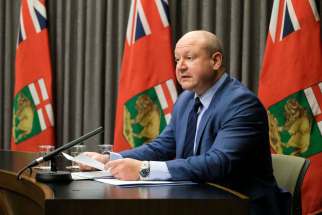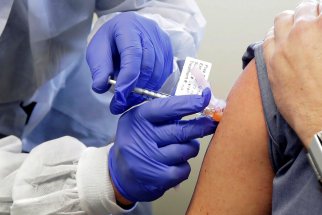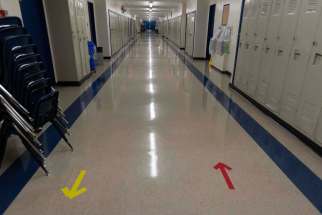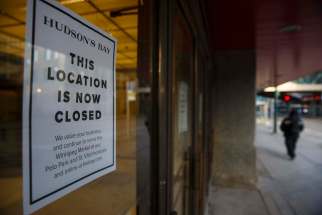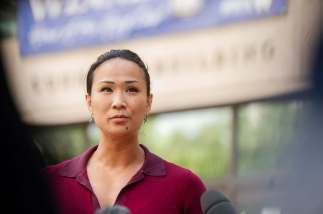Pallister accused of vaccine fear-mongering Premier fears problem if large numbers of off-reserve First Nations community members travel to jump queue
Read this article for free:
or
Already have an account? Log in here »
To continue reading, please subscribe:
Monthly Digital Subscription
$0 for the first 4 weeks*
- Enjoy unlimited reading on winnipegfreepress.com
- Read the E-Edition, our digital replica newspaper
- Access News Break, our award-winning app
- Play interactive puzzles
*No charge for 4 weeks then price increases to the regular rate of $19.00 plus GST every four weeks. Offer available to new and qualified returning subscribers only. Cancel any time.
Monthly Digital Subscription
$4.75/week*
- Enjoy unlimited reading on winnipegfreepress.com
- Read the E-Edition, our digital replica newspaper
- Access News Break, our award-winning app
- Play interactive puzzles
*Billed as $19 plus GST every four weeks. Cancel any time.
To continue reading, please subscribe:
Add Free Press access to your Brandon Sun subscription for only an additional
$1 for the first 4 weeks*
*Your next subscription payment will increase by $1.00 and you will be charged $16.99 plus GST for four weeks. After four weeks, your payment will increase to $23.99 plus GST every four weeks.
Read unlimited articles for free today:
or
Already have an account? Log in here »
Hey there, time traveller!
This article was published 01/12/2020 (1838 days ago), so information in it may no longer be current.
Premier Brian Pallister said he’s concerned that Indigenous people may flock to reserves for coronavirus vaccinations — “maybe taking COVID with them” — if Ottawa doesn’t clearly state its priorities for immunization.
At a news conference Tuesday, the premier expressed concern about a migration of off-reserve Indigenous people travelling to northern First Nations to get COVID-19 vaccinations if they’re not available in southern Manitoba.
“Manitoba has the highest percentage of Indigenous people in the country,” the premier said, noting half of First Nations members live off reserve. “That’s why it would be really helpful if the province had clear criteria from the federal government on who’s going to get the vaccine, who’s going to deliver it and when.”
Manitoba can do the “where” and “how” on vaccine delivery and is “happy to help,” but unless Ottawa spells out its vaccine strategy for on-reserve Indigenous people in Manitoba, “this is going to be a serious problem,” he said.
“If a vaccine is made available on northern reserves before it’s available in southern Manitoba, we’re going to have an outpouring — a migration of folks, naturally, who want to get vaccinated — up to northern communities. Maybe taking COVID with them. This is not a plan. We need a plan.”
The Grand Chief of the Assembly of Manitoba Chiefs said he has no idea where Pallister got the idea that there will be a vaccination migration to northern First Nations.
“I think the premier is a little misinformed,” said Arlen Dumas. “If he’s really interested, he should give us a call and we’ll talk about it.”
The First Nations COVID-19 Pandemic Response Co-ordination Team is working with provincial health leaders, including Manitoba’s chief public health officer, Dr. Brent Roussin, and federal health officials, Dumas said in an interview Tuesday.
The team has developed a priority framework for rollout of the vaccine when it is ready, the grand chief said.
“Statistics show our on- and off-reserve populations are both disproportionately impacted by COVID-19. It doesn’t matter whether it’s up north or down south,” he said, adding there’s no indication the plan is to first vaccinate everyone on northern First Nations.
“There won’t be a big exodus to the North. That’s not going to happen.”
By singling out First Nations as a potential problem in Manitoba’s vaccine rollout, the premier is dodging questions about his government’s lack of planning, NDP Leader Wab Kinew said.
“Here we have a Progressive Conservative government that’s pointing the finger and making excuses and trying to change the subject,” Kinew told reporters after question period. “This is one of the very crucial parts of the pandemic response — what is the plan for vaccines?”
Pallister’s suggestion that urban Indigenous people would travel north to jump the immunization queue is “an absolutely contemptible thing to say,” said Liberal Leader Dougald Lamont.
Canada has ordered sufficient supplies for everybody, Lamont said.
“What he’s saying is fear-mongering; it’s divisive, it’s discriminatory. It doesn’t describe how people actually act in real life. It’s a complete lack of judgment.”
Decisions are easy when it comes to getting the vaccine first to the most vulnerable Manitobans, such as seniors in personal-care homes and front-line care workers, Pallister said.
“But the devil is in the details when you get beyond that. Should it be done on the basis of age, or how do you determine vulnerability? Should it be done on the basis of ethnicity? Should it be done on the basis of race in some way? These questions have to be addressed.”
Pallister said he raised concerns about a co-ordinated national vaccine strategy with the prime minister during last week’s meeting of first ministers, a number of whom shared his concerns.
“I’m adamant that this is, frankly, a very emotional issue for Canadians. Canadians deserve to have some answers to these questions. This is lifeboat time. We know that we can’t have everybody on the limited number of lifeboats that are going to appear as vaccines come in limited numbers in dribs and drabs,” he said.
“When we’re talking lifeboats, we think of the Titanic and not everyone made it off,” said Kinew, who called Pallister’s lifeboat analogy “unfortunate.”
“The message I would hope that the premier would instead share is not that there’s a limited number of lifeboats but, ‘We can all get off the ship together to safety if we work together, and here’s the plan.'”
Ottawa has not specified how it plans to distribute vaccines to Indigenous communities, but Canada’s chief public health officer reiterated Tuesday that remote reserves will be near the top of the list.
“The prioritization would take into account the epidemiology of who’s at higher risk and who may be at increased risk of transmitting to those (who are) high risk,” Dr. Theresa Tam told reporters on Parliament Hill.
“What we’re going to be doing right now is getting more granular with the planning for the delivery to those specific groups… obviously prioritizing those in high-risk settings and remote and isolated areas, and discussing with First Nations, Inuit and Métis leadership on their priorities.”
carol.sanders@freepress.mb.ca
larry.kusch@freepress.mb.ca
— with files from Dylan Robertson


Our newsroom depends on a growing audience of readers to power our journalism. If you are not a paid reader, please consider becoming a subscriber.
Our newsroom depends on its audience of readers to power our journalism. Thank you for your support.




